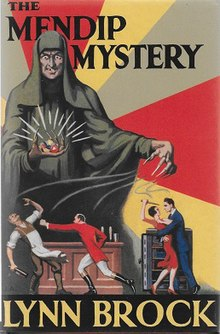Lynn Brock (the main pen-name of the Irish novelist and playwright Allister McAllister) was a major figure in Golden Age detection and his character Colonel Wyckham Gore was, for a time, one of the leading fictional detectives in a crowded field. Brock's mysteries were convoluted and often ingenious, but although the quality of his writing was a cut above the average, his work soon faded from sight.
His strengths and his weaknesses are on display in The Mendip Mystery, published in 1929 and known as Murder at the Inn in the United States. Gore is asked by a chap called Stanton to look into the whereabouts of a woman who has been missing for many years. I found it rather astonishing that Gore didn't press for an explanation as to why his client wanted to track her down and this omission does rather haunt the story.
Anyway, off he goes to the south west, only to pick up another job. He stays at a very seedy inn, the sardonically named Bower of Bliss, and encounters two beautiful young women. Before long, all manner of dark deeds are taking place. At times it isn't easy to keep track of what's going on, and in due course some very lengthy explanations - a Brock trademark - are required, in order for us to understand fully all that has occurred.
There are some unorthodox ingredients, including a rare example of the murder of a child (rather horribly suffocated under a load of gravel - Brock was quite a tough writer) as well as some that are more commonplace and some (notably an account of escapees from an asylum) that definitely haven't stood the test of time. In particular, the ending is highly unusual.
It's not really a spoiler to say that the main culprit gets away with it, because Brock wrote a follow-up novel called Q.E.D., aka Murder on the Bridge, in which he revealed all. This was a daring experiment, followed up in rather lamentable fashion, a few years later by G.D.H. and Margaret Cole in another pair of novels, 'the Pendexter Saga'. Brock's endeavour is more successful, and I admire his ambition. He is one of those authors whose books are flawed but more interesting than many a smoothly accomplished formulaic whodunit.
